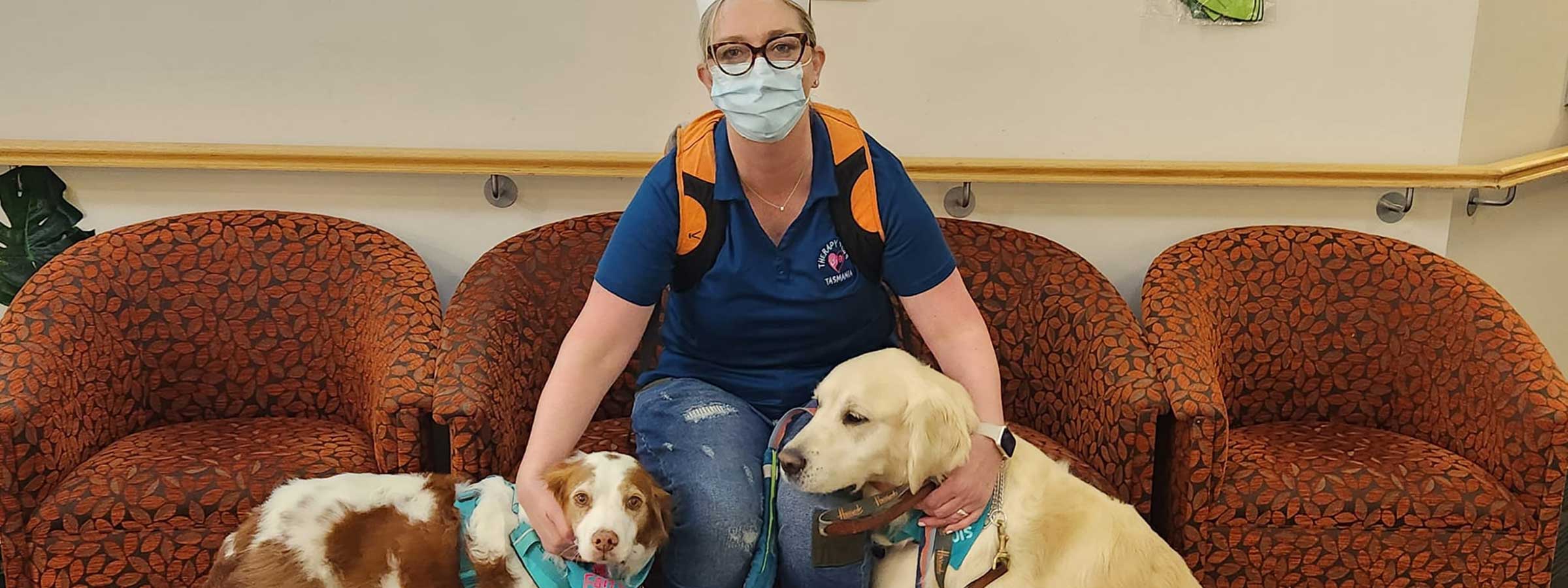
Pet therapy visits can be life changing for aged care residents
There are many benefits to pet therapy. A visit from a trained therapy dog and handler team to aged care facilities can help build social connection, increase feelings of well-being and assist people who are dealing with stress and anxiety.
Lisa Farrall, a retired registered nurse, had been training one of her dogs, Teddy, for over three years to fulfill the role of a therapy dog and was getting quite frustrated that therapy dog training providers on the mainland were not coming to Hobart to do assessments.
Lisa began discussing the issue with dog lovers at Tracking and Scentwork trials she was participating in with her dogs, and the idea was born to start up a locally owned and run business to get dogs into the community!
In October 2021, Lisa and her business partner Danielle Morris launched Therapy Paws Tasmania (TPT), a volunteer-based business that provides much needed ‘canine comfort visits’ to businesses, schools and healthcare settings in Hobart.
At TPT, Lisa’s role is to find clients, assess dog and handler teams and visit facilities with her own three therapy dogs, Teddy, Faith and Baloo. TPT has 12 dog and handler teams with multiple therapy dogs, like Lisa. Danielle and Lisa also do three supervised ‘buddy shifts’ with every team.
“Not only do we do one team visits, we also do big group visits,” says Lisa. “We organise four or five dogs that do tricks like Scentwork and then receive lots of pats and cuddles at the end. The dogs all love it!”
“We have approached many aged care facilities, but unfortunately they often don't see the dogs visiting as a priority or simply do not have the funds to pay for the visits,” says Lisa.
“In an ideal world, we would not have to charge for visits, but insurance is not cheap to cover the teams. We also use those funds to supply our teams with uniforms to wear to their visits. I personally take each team to three supervised visits in different facilities to see how they cope.”
TPT currently provides pet therapy to residential aged care facilities Queen Victoria Care and Barossa Lodge, as well Universities, Emergency Departments, Ambulance Tasmania, Vacation care, Mental health facilities, group homes, agencies with underprivileged youth, and special events like a Variety camp with non-verbal children.
“We try to cover all of Tasmania but only have three teams up north at the moment. We are always on the lookout for teams to volunteer and need funding to continue what we do,” says Lisa.

Lisa Farrall, co-founder of Therapy Paws Tasmania
Ideal pet therapy dog for aged care
The ideal dog for aged care settings comes in many shapes and sizes, and there is not a "one size fits all,” says Lisa.
“Therapy dogs need to love people,” she says. “They also definitely need to be calm and gentle around aged care residents. They cannot be jumping, pawing or getting rough in any way due to the fragile nature of most residents.”
Unlike medium/large dogs, smaller therapy dogs can be a challenge as they are usually too low to have a pat. So smaller therapy dogs need to be happy to sit up on a chair to be more accessible or even sit on someone's lap if requested, explains Lisa.
“A lot of our dogs also do tricks and the residents just love that. It engages them and adds a bit of fun to the visit,” she says. “A lot of our dogs are also very good at reading a room. If the resident is not well or a bit sad, they simply go in and just sidle up for a pat and cuddle. If other residents are well and having fun, the dogs know that and match the mood accordingly. It is very special to watch them work.”
Therapy dogs also need to be prepared for absolutely anything, says Lisa.
“Loud noises, screaming, fights, arguments, aggressive behaviour… They need to be comfortable around wheelchairs, walkers, trolleys, frames. Or be able to leave food on the floor and walk past with a cue from the handler,” she adds.
Handlers also need to be prepared to act in an instance and ensure their own and their dog’s safety are paramount.
“For the health and wellbeing of the dogs, no teams are allowed to work more than 90 minutes per day but the average is 60 minutes. If the dogs are doing the job well, they are exhausted after an hour,” says Lisa.
Pet friendly aged care facilities
Lisa is not aware of any aged care facilities in Tasmania keeping resident dogs, but she knows many aged care staff who take their own dogs in with them.
“I would love to see all areas of Tasmania become more dog friendly, not just aged care facilities. But unfortunately, many dog owners do not understand dog behaviour, dog body language and then incidents occur,” says Lisa.
“More education about pet therapy for dog owners would be a start. I speak to a lot of people when taking my own dogs out. I am told regularly that their dog would be a great therapy dog. Loving people is simply not enough. They need to be ok with whatever comes their way.”
For instance, whilst therapy dogs need to be able to toilet on command, their handlers need to be able to recognise if their dog is stressed and end the session.
“It comes down to many years of obedience training and knowing the dog like the back of your hand. And when you can do all that, you need to maintain it, so the training never stops,” says Lisa.
“While a career in nursing gave me a lot of pride in helping others, to work with all these amazing (therapy dog and handler) teams gives me the most fulfilment. We are making a difference day by day.
“When an ED staff member or an Aged Care resident calls out to your dog "Teddy I love you so much, see you soon" as you leave for the day, I secretly hold back the tears and give my ‘goodest boy’ a big kiss.”
Lisa says pet therapy visits make an “enormous difference” to aged care residents.
“You often walk into a quiet room and the mood instantly changes. Their faces are beaming, their speech is bright and enthusiastic,” she says.
“We talk a lot about our dogs and the dogs they had. Sometimes it is quite sad as quite a few have had to rehome their beloved pets when going into care. Our visits never replace that bond they had with their own pets, but they just love the interaction they can get from ours. I'm so very lucky to witness these special moments and am truly grateful for all our volunteers and their beautiful dogs.”
Subscribe to our Tales
Tales, the official blog of Australia CAN, is full of news from our network, updates on our advocacy efforts and heartwarming stories that celebrate the human-animal bond. Please enter your email address above so we can let you know when a new Tale has been published, and also occasionally send out other important announcements. Thanks for staying in touch!




